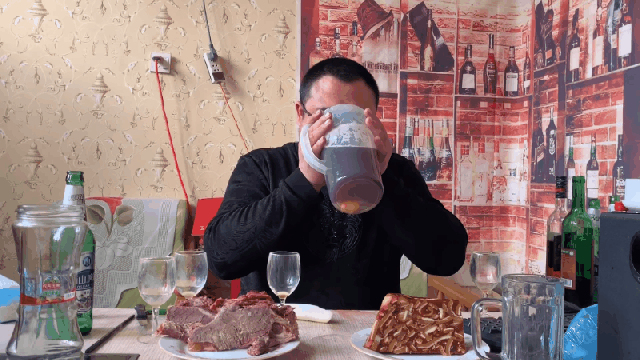Lawmakers in China are considering new legislation that would impose fines against anyone who creates videos where people eat large quantities of food or binge drinks, according to a new report from Chinese state media outlet China News. The proposed media rule, part of broader legislation to discourage food waste, would also allow restaurants in China to charge extra for customers who don’t finish their meals.
The Chinese government under President Xi Jinping started a campaign called the Clean Plate Campaign earlier this year in an effort to waste less food domestically. Xi said over the summer that the goal was to create a social order where “waste is shameful and thriftiness is applaudable.” Fines for breaking the new law would range from 10,000 yuan to 100,000 yuan, or roughly $US1,530 ($2,034) to $US15,300 ($20,344) in U.S. currency.
Binge-eating and drinking videos, known by the word “mukbang,” became popular in China in recent years. Mukbang is a combination of the Korean words for “eating” and “broadcast, with viral stars like Pangzai doing precisely that and enjoying internet fame with English-speaking audiences on platforms like Twitter and YouTube.
What exactly does Pangzai do? He eats a lot of food, smokes cigarettes, and drinks alcohol stylishly — all while sometimes telling stories about his life, his home, and his family. It’s all much cooler and more visually compelling than it sounds, but Pangzai announced in August that he would no longer be making videos due to a government crackdown. Amazingly, Pangzai reemerged this month on Twitter.
The draft legislation, first reported in English by Sixth Tone, was submitted to China’s Standing Committee of the National People’s Congress on Tuesday, and covers “radio stations, television stations, and online audio and video service providers.” An audio-only version of mukbang sounds kind of gross, but who are we to judge?
Traditionally, it’s very polite in China to serve guests large portions of food, a way to show generosity that would be familiar to many Americans. But that generosity is creating a culture of waste, where an estimated 17 million pounds of food in China gets thrown out every year. That much food could feed an additional 30 million people each year at the very least — roughly the entire population of Texas — according to a recent study from the Chinese Academy of Science and the World Wildlife Fund.
While we’re sympathetic to the idea of reducing food waste, this does seem to be another area where the Chinese government has overstepped. If you’ve ever seen a video by the 34-year-old Pangzai, you know there’s no food or drinks there going to waste.
Pangzai is a champ who’s simply sharing his life with the internet, even if he’s swirling a “tornado beer” while he’s doing it.
In fact, this blogger initially assumed Pangzai’s videos might be officially approved by the Chinese government when they started going viral last year, given their popularity on western social media platforms. Pangzai is a middle class guy in China who arguably helps internet users outside of the country relate to a culture they often only hear about negatively in the mainstream American press. Alas, Pangzai wasn’t engaging in state-sanctioned Tornado Beer Diplomacy with the rest of the world. If this new law passes, he’s officially a renegade.
China’s cyber police reportedly shut down over 13,000 mukbang video accounts recently in a bid to stamp out food waste, arguably pushing the U.S. and China further apart during a contentious period in the New Cold War. We need more mukbang, not less, if we want average people on both sides of this stupid conflict to understand each other better and avoid the mistakes of the first Cold War.
It’s not clear what will happen to Pangzai’s Twitter account if the new anti-binge law passes, but he’s still doing his thing after his triumphant return on December 1.
I’m sorry, my friends. I’ve been very busy lately. I haven’t updated the video. I miss you. Cheers. pic.twitter.com/gOzqGLt4fs
— Pangzai (@hebeipangzai) December 1, 2020
We almost didn’t survive that bizarre period from 1945-1990 when the Soviet Union and the U.S. were always 20-minutes away from global destruction, given the nuclear near-misses we’d only learn about decades later. But today we have the internet and mukbang to help bridge the cultural divide. We should keep it that way.
